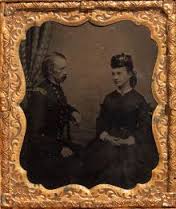Take a chance. Enter to win a copy of the book
None Wounded, None Missing, All Dead: The Story of Elizabeth Bacon Custer.
“…Girls needn’t try to get her dear Bo away from her, because he loves only her, and her always.”
George Custer to Elizabeth Custer – 1871
The day was gray, and a raw, cold wind swirled outside the windows of the late Judge Albert Bacon’s home in Monroe, Michigan. It was early fall 1868. The Judge’s daughter, Elizabeth, and son-in-law, George, sat inside the parlor of the stately home. Each was quietly involved in their individual tasks. George was hunched over a writing table working on a book about his days at West Point. Elizabeth set aside some sewing she was doing and drifted over to a piano in the corner of the room. Her husband glanced up from his writing long enough to see that Elizabeth wasn’t going far. After weeks of being apart he wanted her near him at all times.
The genteel army wife made herself comfortable at the polished keyboard then reached for a stack of music bound in a faded leather pouch. She untied the ribbon holding the music together and sifted through the pages. Inside one of the pieces of sheet music was a daguerreotype of George. It had been taken in April 1865 and he was dressed in his major general uniform; the two stars on his collar clearly displayed. Some of the music had left its imprint on the picture, the notes like a melody over his face.
Elizabeth sat her husband’s picture on the stand next to the song she selected and began to play. The ebullient sound filled the air. Although he was tapping his foot in time with the beat, George’s attention was trained on the assignment before him.
For a moment Elizabeth wondered if he might only be pretending to be engrossed in writing. She worried that he longed to be doing something else. Nearly a year had passed since a nine member military jury found George guilty of “leaving his post without permission, excessive cruelty, and illegal conduct in putting down mutiny in the 7th Cavalry by shooting deserters.” The punishment he received as a result of the court-martial was a year suspension from rank, duty, and pay. George’s yearly pay was $95 a month.
George and Elizabeth were affected by the verdict. Courts-martial were commonplace. More than half the army servicemen were tried and court-martial in 1867 alone. Far from feeling disgraced by the ordeal, the Custers planned to spend the time away from the job and the frontier enjoying one another’s company, entertaining family, and traveling abroad.
After a short respite from frontline service Elizabeth began to doubt how long George would remain content away from active duty. She knew how much her husband loved the soldier’s life. He had once admitted, “I would be willing, yes glad, to see a battle every day during my life.”
To learn more about Elizabeth Bacon Custer and her marriage to George Armstrong Custer read
None Wounded, None Missing, All Dead: The Story of Elizabeth Bacon Custer.


